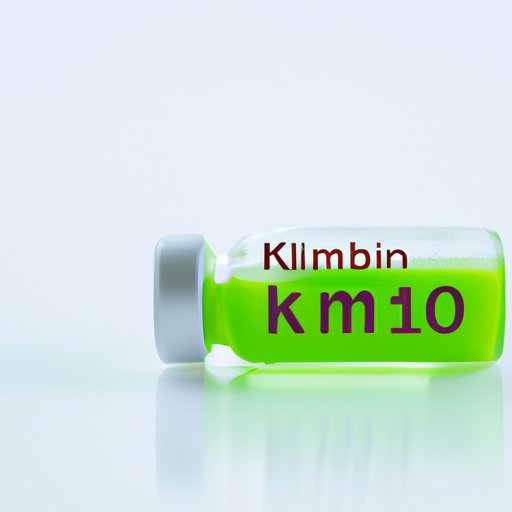
Introduction
Welcoming a newborn into the world is a joyous and exciting occasion for parents and families. However, it is also a critical time when parents need to ensure that their newborn’s health is protected. One of the most essential steps in newborn care is administering Vitamin K shots right after birth. Parents may find themselves wondering why Vitamin K is essential for newborns, and what benefits and risks it presents.
This article aims to provide a comprehensive and informative guide on Vitamin K administration for newborns. We will discuss the importance of Vitamin K, the science behind its absorption and distribution in the newborn’s bodies, benefits and risks of providing Vitamin K shots, and how insufficient Vitamin K levels can affect a newborn’s health. Let us take a closer look.
The Importance of Vitamin K for Newborns
Vitamin K is an essential nutrient required for blood clotting and maintaining a healthy cardiovascular system. Without adequate Vitamin K levels, bleeding disorders such as hemorrhagic disease of newborns (HDN) can occur. HDN is a severe bleeding disorder that can have long-term effects on a newborn’s health. While HDN is rare, it can happen to newborns who have insufficient Vitamin K levels.
Understanding the Science Behind Vitamin K Shots for Newborns
Newborns are susceptible to Vitamin K deficiency because of the low amount of Vitamin K that crosses the placenta during pregnancy. Additionally, Vitamin K is not present in high enough quantities in breast milk to provide the necessary Vitamin K levels needed for newborns. Therefore, Vitamin K shots are recommended for newborns to provide adequate protection against HDN.
Why is Vitamin K Given to Newborns? The Benefits and Risks Explained
The primary benefit of Vitamin K shots for newborns is the prevention of bleeding disorders such as HDN. According to the American Academy of Pediatrics, Vitamin K shots have led to a significant reduction in HDN cases in the US. However, there are certain risks associated with Vitamin K shots. Some studies suggest that high doses of Vitamin K in newborns can cause jaundice. However, these cases are rare and are not related to the Vitamin K shots themselves but the delivery method of the Vitamin.
A Closer Look at Vitamin K and its Role in Newborn Health
Insufficient Vitamin K levels in newborns can have harmful effects on their overall health. Vitamin K is essential for blood clotting, and without adequate levels, newborns can develop bleeding disorders that can have long-term effects. Vitamin K is also crucial for cardiovascular health, as it helps calcium regulate blood vessel elasticity and prevents arterial calcification.
Newborn Health: The Vital Role of Vitamin K
Ensuring proper newborn care is critical for a healthy and happy start to life. Administering Vitamin K shots right after birth is an essential step in preventing bleeding disorders and protecting newborn health. HDN can have severe long-term effects, including brain damage and even death. To ensure proper newborn health, it is essential to maintain adequate Vitamin K levels in newborns.

Vitamin K and Newborns: What You Need to Know
Vitamin K administration is a simple procedure that usually takes place at the hospital after the birth of a newborn. Parents can opt for oral Vitamin K supplements, but these may not be as effective as the shots. It is recommended to consult with a healthcare provider to determine the most suitable method of Vitamin K administration for their child. Also, parents should monitor their newborns’ progress and report any unusual symptoms or reactions to Vitamin K shots.
The Controversy Around Vitamin K Shots for Newborns: An Expert Perspective
There have been some controversies in the past regarding the administration of Vitamin K shots for newborns. Some experts have raised concerns about the possible risks associated with Vitamin K shots. However, most of the concerns and controversies are unfounded.
According to medical experts, Vitamin K shots are not only safe but also highly effective in preventing bleeding disorders and promoting newborn health. As mentioned earlier, the risk of jaundice related to Vitamin K shots is rare and not directly related to the shots themselves.
Conclusion
In conclusion, Vitamin K is a vital nutrient required for proper blood clotting and maintaining cardiovascular health. For newborns, administering Vitamin K shots right after birth is essential for preventing bleeding disorders like HDN, which can have severe long-term effects. While there may be some risks associated with Vitamin K shots, these are minimal and can be effectively managed. Parents should consult with their healthcare provider to determine the best method of Vitamin K administration for their newborn. By taking action early and ensuring proper newborn care, parents can promote their child’s overall health and well-being.




